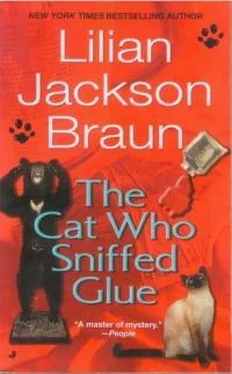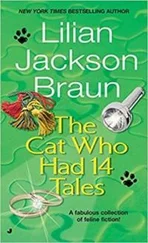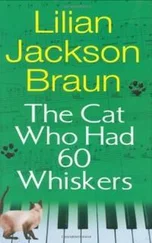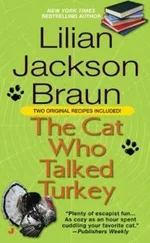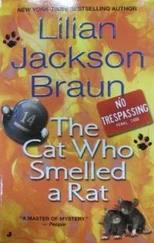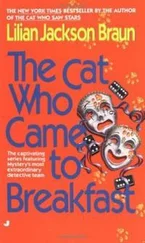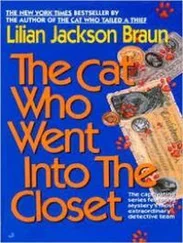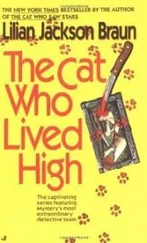"I see," said Eddington with vague comprehension. Those were his last words for the next half hour. He was. one of those intense drivers who are speechless while operating a vehicle. He gripped the wheel with whitened knuckles, leaned forward, and peered ahead in a trance, all the while stretching his lips in a joyless grin.
"My car flipped over in a ditch on Ittibittiwassee Road Sunday night, and it's totaled," Qwilleran said and waited (or a sympathetic comment. There was no reaction from the mesmerized driver, so he continued.
"Fortunately I had my seat belt fastened, and I wasn't hurt except for a lump on my elbow as big as a golf ball and a stitch in my side, but the cats were thrown from the car. They disappeared in the woods. By the time I found them, they'd had an altercation with a skunk, and I had to drive them to the animal clinic. Did you ever spend fifteen minutes with two skunked animals in a car with the windows closed?"
There was no reply. "I didn't dare roll the windows down more than an inch or two, because the cats were loose in the backseat, and I didn't know how wild they'd be after their experience. I couldn't breathe, Edd! I thought of stopping at the hospital for a shot of oxygen. Instead I just stepped on the gas and hoped I wouldn't turn blue."
Even this dramatic account failed to distract
Eddington's concentration from the road.
"When I got home, I took a bath in tomato juice. Mr. O'Dell raided three grocery stores and bought every can they had on the shelf. He had to burn my clothes and the cats' coop. Their commodes were in the car when it flipped, and they rattled around like ice cubes in a cocktail shaker. One of them conked me on the head. I'm still combing gravel out of my hair and moustache."
Qwilleran peered into Eddington's face with concern. He was conscious, but that was all.
"The cats were deodorized at the clinic, but there's no guarantee it'll last. I may have to buy a gallon of Old Spice. I'm trying to keep them downwind."
After a while Qwilleran tired of hearing his own voice, and they drove in funereal silence until they reached the Fitch mansion. Eddington parked the car at the backdoor in a service yard enclosed by a high, stone wall.
If the murderers had parked there, Qwilleran observed, their vehicle would not have been visible from either of the approach roads; on the other hand, if they had stationed a lookout in the vehicle, he could not have seen David and Jill approaching. The lookout may have been patrolling the property with a walkie-talkie, he decided.
Eddington had a key to the back door, which led into a large service hall - the place where Harley's body had been found. Doors opened into the kitchen, laundry, butler's pantry, and servants' dining room. Qwilleran was carrying the wicker hamper; Eddington was carrying a shopping bag, and after groping in its depths he produced a can of soup and two apples and left them on the kitchen table. Then he led the way to the Great Hall.
Although lighted by clerestory windows 30 feet overhead, the hall was a dismal conglomeration of primitive spears and shields, masks, drums, a canoe carved from a log, shrunken heads, and ceremonial costumes covered with dusty feathers. Qwilleran sneezed. "Where is the library?" he asked.
"I'll show you the drawing room and dining room first," Eddington said, opening large, double doors. These rooms were loaded with suits of armor, totem poles, stone dragons, medieval brasses, and stuffed monkeys in playful poses.
"Where are the books?" Qwilleran repeated.
Opening another great door Eddington said, "And this is the smoking room. Harley cleared it out and moved in some of his own things."
Qwilleran noted a ship's figurehead, carved and painted and seven feet tall, an enormous pilot wheel, a mahogany and brass binnacle, and an original print of the 1805 gunboat, signed, and obviously better than his reproduction. There were several sailing trophies. And on the mantel, on shelves and on tables there were model ships in glass cases.
The hamper that Qwilleran was clutching began to bounce and swing.
He said, "Koko is enthusiastic about nautical things. Would it be all right to let him out?"
Eddington nodded his pleasure and approval. " 'Enthusiasm is the fever of reason,' as Victor Hugo said."
It was the liveliest display of spirit that Koko had shown since his ordeal. He hopped out of the hamper and scampered to a two-foot replica of the HMS Bounty, a three-masted ship with intricate rigging and brass figurehead. Then he trotted to a fleet of three small ships: the Ni¤a, the Pinta, and the Santa Maria, all under full sail with flags and pennants flying. When he discovered a nineteenth century gunboat with brass cannon, Koko rose on his hind legs, craning his neck and pawing the air.
"Now where's the library?" Qwilleran asked as he returned a protesting cat to the hamper.
It was a two-story room circled by a balcony, with books everywhere. Although there were no windows - and no daylight to damage the fine bindings - there were art-glass chandeliers that made the tooled leather sparkle like gold lace.
"How many of these do we have to dust?" Qwilleran wanted to know.
"I do a few hundred each time. I don't hurry. I enjoy handling them. Books like to be handled."
"You're a true bibliophile, Edd."
" 'In the highest civilization, the book is still the highest delight.' That's what Emerson said, anyway."
"Emerson would have a hard time explaining that to the VCR generation. Let me close the doors and release Koko from his prison. He'll flip when he sees these books. He's a bibliophile himself."
Koko leaped from the hamper and surveyed the scene. On three walls there were banks of bookshelves alternating with sections of fine wood paneling, each with a curio cabinet containing small collectibles in disorganized array.
There were Indian arrowheads and carved ivories, seashells and silver chalices, chunks of quartz and amethyst mixed with gold figurines that might have been smuggled from an Egyptian tomb. (Amanda had said a lot of them were fakes.) Above each cabinet was a mounted animal head or a gilded clock or an elaborate birdcage or a display of large bones like relics of some prehistoric age. Koko inventoried all of this, then discovered the spiral staircase, which he mounted cautiously. It was different from any of the staircases he had known.
Meanwhile, Eddington had pulled a bundle of clean rags from his shopping bag. "You can start in that comer with S. I left off at R. Slap the covers together gently, then wipe the head and sides with a cloth. Dust the shelf before you put the books back."
By this time Koko was whirling up and down the spiral stairs in a blur of pale fur and using the balcony as an indoor track.
Eddington opened the shallow drawer of the library table, a massive slab of oak supported by four carved gryphons. He removed the drawer entirely, and, after groping inside the cavity, brought out a key. "The rare books are in a locked room with the right temperature and humidity," he said. " 'Infinite riches in a little room,' as Marlowe said." Carrying his shopping bag he unlocked a door in a paneled wall and stepped inside. Qwilleran heard the lock click.
As he started dusting he pondered how much of Eddington's time in the locked room was spent with Cyrus Fitch's torrid literature. He himself had to exercise severe self-discipline to resist reading everything he dusted: Shaw, Shelley, Sheridan, for starters.
Koko busied himself here and there, and his activity and excitement caused his deodorant to lose its effectiveness. "Go and play at the other end of the room," Qwilleran told him. "Your BO is getting a little strong."
At noon Eddington reappeared and said somberly, "Time for lunch." He looked worried.
Читать дальше
